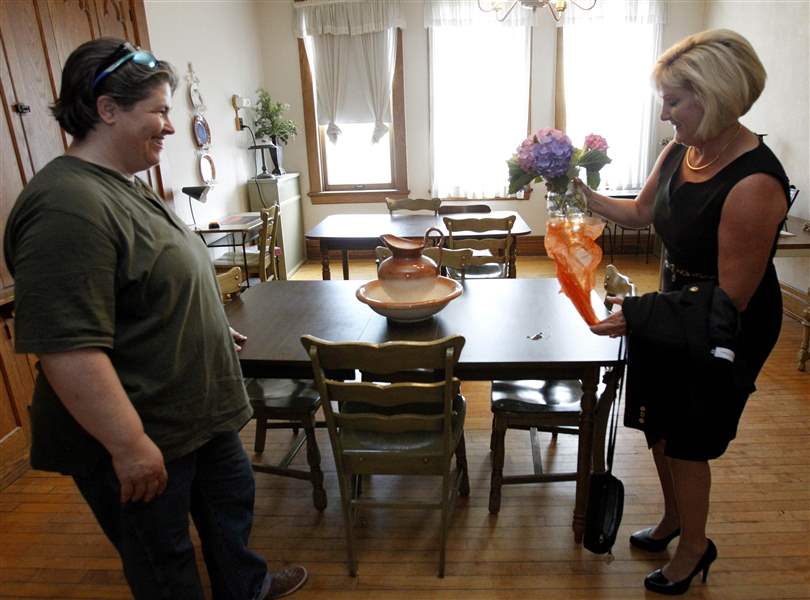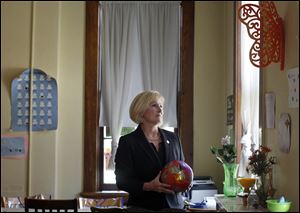
Fedor found voice in human-traffic battle
6/26/2012
Mary Schmidbauer watches Rep. Teresa Fedor unwrap flowers at Second Chance, a Toledo service for trafficking victims and prostitutes. Gov. John Kasich is to sign the ‘Safe Harbor' bill there Wednesday.
The Blade/Amy E. Voigt
Buy This Image

Rep. Teresa Fedor (D., Toledo), stands in the craft and play room at Second Chance, a social service program which provides comprehensive services to victims of domestic sex trafficking and prostitution.
COLUMBUS — "Without her, we wouldn't have a voice," a former human-trafficking victim recently said of Rep. Teresa Fedor.
But one might also say that it was this victim and others like her who gave the Democratic lawmaker from Toledo her voice.
The former elementary school teacher and former Air Force staff sergeant has without a doubt experienced political success. She'd been in the Ohio House only two years before Lucas County voters promoted her to the Senate in 2002. In 2010, when term limits forced her out of the chamber, they sent her back to the House. She faces no Republican opposition for re-election this year.
But making legislative gains proved more elusive.
An unscientific poll in the summer of 2007 by Columbus Monthly magazine of 100 lawmakers, lobbyists, and players in Gov. Ted Strickland's administration, and other Statehouse insiders ranked her among the least effective and politically savvy of state lawmakers.
Her colleagues in the Senate Democratic Caucus, a very small club, dumped her as their elected leader in early 2008 after an internal coup.
But just two weeks ago, many of those same Democratic senators and their more plentiful Republican counterparts gave Ms. Fedor a standing ovation after the chamber unanimously passed House Bill 262, the so-called "Safe Harbor" bill.
Gov. John Kasich is to sign it into law Wednesday at Second Chance, a Toledo social service program offering help to trafficking victims and prostitutes.

Mary Schmidbauer watches Rep. Teresa Fedor unwrap flowers at Second Chance, a Toledo service for trafficking victims and prostitutes. Gov. John Kasich is to sign the ‘Safe Harbor' bill there Wednesday.
"There's no higher calling than fighting for those who can't fight for themselves," said Sen. Mark Wagoner (R., Ottawa Hills), the Senate Judiciary Committee chairman who helped to work through last-minute changes to get the bill over the finish line.
"Teresa is to be commended for taking up this issue, for the energy she put behind it, and for the commitment to see it through," he said.
The bill seeks to push the reset button for government, law enforcement, judges, and others to look at those forced or coerced into selling themselves, especially minors, as victims rather than as criminals.
Initially struggling to get bipartisan support, Ms. Fedor reached out to a man who, at least through much of 2011, was considered by Democrats to be the enemy — Mr. Kasich.
When the Republican governor signed on, Ms. Fedor was in disbelief.
"This was different for her," Mr. Kasich recalled. "She asked me, ‘Are you really serious that you're going to help me?'?"
The highly contentious fight over Senate Bill 5, which ended last November when voters rejected the Republican-passed restrictions on public employee unions, was still fresh in lawmakers' minds.
"I know I'm dancing on the edge of a knife here, but this issue's more important than the politics of this place," said Ms. Fedor.
No political backlash came.
The trafficking issue has brought Mr. Kasich, the father of 12-year-old twin daughters, close to tears multiple times.
"I knew about human trafficking worldwide, but I was certainly not aware of the situation in this state… " he said. "It doesn't just touch me because I have daughters. That's part of it, but it's anybody's children."
In addition to signing the bill into law, Mr. Kasich's own interagency task force on trafficking will release its recommendations on how the state can better respond to the problem on Wednesday.
"Instead of prosecuting these people, we're beginning to recognize these people are victims," Mr. Kasich said. "Secondly, those people who knowingly engage with these traffickers and abuse them, the book is going to be thrown at them. We had this bust [near Bowling Green] that's had a significant amount of attention, so the word is out: You're going to jail and for a long time.
"And the women who are out there, the people who have been trafficked, they can come forward, and we will not prosecute you," he said. "We will treat you and help you get your life back."
Incremental gains
The gains have been incremental. In 2008, Ms. Fedor persuaded her colleagues to amend a separate bill to create a human trafficking specification that, when attached to a related crime such as compelling prostitution, could increase the severity of the sentence.
Ms. Fedor said she knew the specification would not be used, but saw it as the first step to getting human trafficking recognized in Ohio law.
More important, she said, was a provision authorizing then Attorney General Richard Cordray, a Democrat, to create a commission to quantify modern-day slavery in Ohio.
The statistics that emerged from the commission were a kick in the stomach.
They suggested that as many as 2,879 youths born in Ohio are at risk for sex trafficking and that 1,078 have been trafficked over the course of a year.
In terms of raw numbers of arrests, investigations, and rescues of children involved in the sex trade, the commission suggested that Toledo ranked fourth in the nation behind Miami, Portland, Ore., and Las Vegas. When adjusted for population, Toledo climbed to No. 1.
"We feel that the models were reasonable and conservatively estimated, but I also think the estimate woke some people up," said Celia Williamson, professor of criminal justice and social work at the University of Toledo and leader of the commission subcommittee that presented the numbers.
But even when armed with those numbers, she was surprised at the success Ms. Fedor had.
"I was astonished that she was able to pass such a comprehensive Safe Harbor law," Ms. Williamson said. "It's more than we could have realistically dreamed."
The numbers were somewhat skewed by a 2005 federal child prostitution sting in Harrisburg, Pa., involving 177 females. Seventy-seven of them, including a 10-year-old, were from the Toledo area. A 2006 series by The Blade trained a spotlight on Toledo's role as a major recruiting hub for children in the sex trade.
"It made no sense to me that pimps weren't getting arrested, that johns weren't getting arrested," Ms. Fedor said. "They were all misdemeanors. The whole focus was on the prostitutes. In other words, it was always the woman's fault. … And then, when I saw that it was reaching down to our children, I thought, ‘Enough is enough.'?"
‘Rugged determination'
Judge Tim Grendell of Geauga County Common Pleas Court was a Republican state senator in 2010 when he teamed with then Sen. Fedor for the next step, creation of Ohio's first stand-alone, second-degree felony of "trafficking in persons." Mr. Grendell's northeast Ohio district was dealing with its own problem of Asian massage parlors investigated for trafficking.
"She brought a rugged determination and dedication to the issue that, I think, was critical in passage of that legislation a year and a half ago and this legislation," he said. "In my personal opinion, [the latest bill] certainly would not have passed in this advanced state without her efforts."
But he also said that without Mr. Kasich's intervention, a bill as strong as the one that ultimately just passed probably still would have been several years off.
"She's been a huge force," said Attorney General Mike DeWine, a Republican who resurrected the trafficking commission begun under his predecessor.
"She has a real passion for this and persistence," he said. "I've found in government that you have to have those two, and she has them on this issue."
Theresa Flores, of Columbus, a former trafficking victim and now a member of Mr. DeWine's commission, detailed her story in the 2007 book The Sacred Bath: An American Teen's Story of Modern Day Slavery. As a teenager in an affluent Detroit suburb, she was blackmailed and trafficked at night, even if she did return to her own bed under her unsuspecting parents' roof before the sun rose.
"[Ms. Fedor] really is empowering victims and survivors to find their voices," she said. "She's helping them to realize that what happened to them wasn't necessarily their fault. Somebody did this to us, and we need to go after them."
Although happy with the bill that reached Mr. Kasich's desk, Ms. Fedor is already plotting her next move, battling what she perceives to be a misunderstanding among her colleagues over whether a trafficking victim can consent to prostitution — even if she is over 16, the legal age of consent.
"Age of consent should never apply," she said. "These victims are not consenting. They're enslaved. They can't get out. They're being forced to have sex with 20 or 30 men a night — beaten, drugged, raped, kidnapped. They go from city to city. There's no consent involved at all."
Contact Jim Provance at: jprovance@theblade.com or 614-221-0496.